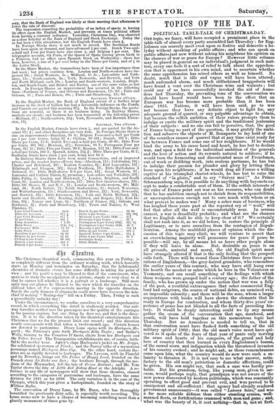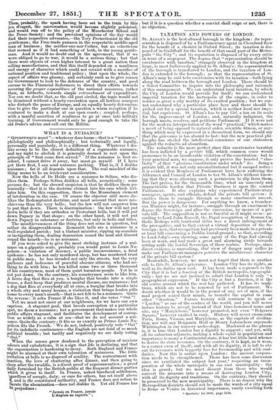TOPICS O1 THE DAY.
POLITICAL TABLE-TALK OF CHRISTMAS-DAY. 0142 topic, we fancy, Will have occupied a prominent place in the table-talk of almost every party assembled last Thursday : for Eng-. lishmen can scarcely meet even upon so festive and domestic a ho- lyday without speaking of public affairs; and who can speak on public affairs just now without asking his neighbour his opinion on the chances of war or peace for Europe P However little reliance may be placed in general on an individual's judgment in such mat- tem, every one feels it a sort of relief to talk about the apprehen- sion that is uppermost in his own mind, and to ascertain whether the same apprehension has seized others as well as himself. No doubt, much that is idle and vague will have been uttered ; much unfounded alarm, and much oldfashioned braggadocio, will have found a vent over the Christmas wine and -walnuts ; but could any of us have successfully invoked the aid of Asmo- dens last Thursday, the prevailing tone of the conversation we should have heard would have been to the effect that an European war has become more probable than it has been since 1815. Nations, it will have been said, go to war not because they have any definite object to fight for, any adequate ground of quarrel, or any palpable advantage to obtain, but because the selfish ambition of their rulers prompts them to indulge or excite the military spirit and the traditional jealousies of their subjects : and no one can fail to perceive, that, the good of France being no part of the question, it may gratify the ambi- tion and subserve the objects of M. Bonaparte to lay hold of one of the countless causes of quarrel that at Any time exist ready for use between France and some one of her neighbours. If he would bind the army to his cause hand and heart, he has but to declare war, and open a field for the individual ambition of the generals and the love of action and its rewards natural to soldiers; if he would turn the fermenting and discontented mass of Frenchmen, out of work or disliking work, into zealous partisans, he has but to indulge their passion for plunder and glory by letting them loose upon his neighbours ; if he would drag all France a willing captive at his triumphal chariot-wheels, he has but to raise the standard of " la gloire," and to cry " Suivez moi !" As Prince Schwarzenberg says, it is possible to do anything with bayonets ex- cept to make a comfortable seat of them. If the selfish interests of the ruler of France point out war as his resource, who can doubt that he has ambition enough not to shrink from its responsibilities, or unscrupulousness enough not to care much with whom or on what pretext he makes war ? Many a sober man of business, who has laughed these years past at the repeated cry of " wolf," will feel that after all the wolf is uncomfortably near. In serious earnest, a war is dreadfully probable ; and what are the chances that we English shall be able to keep clear of it ? We certainly shall not rush into it, as we did before, to restore the principle of Legitimacy, or to save ourselves from the contagion of Repub- licanism. Among the multifold phases of opinion which the dis- cussion of this topic may elicit, we will venture to assert that an overwhelming majority will pronounce for peace if peace be possible—will say, by all means let us leave other people alone if they will leave us alone. But, desirable as peace is on all grounds, material and moral, the old English spirit must have strangely altered if that is the only feeling that the prospect calls forth. There will be round those Christmas fires three gene- rations of Englishmen,—the grey-haired grandsire, who remembers the earlier years of this century, who may have still hung over his hearth the musket or sabre which he bore in the Volunteers or Yeomanry, and can recall something of the feelings with which those weapons were grasped half a century ago ; the father of the family, who has grown up under the notion that war was a folly of the past, a youthful extravagance that sober commercial Eng- land had outgrown, the source of national debts, an unmixed evil, an impossible calamity ; and there will be the sons, whom a larger acquaintance with books will have shown the elements that lit ready in Europe for combustion, and whom thirty-five years' ex- perience of peace has not blinded to all the facts of preceding his- tory. It would be deeply interesting could we by any means gather the cream of the conversation that age, manhood, and youth, will have held together on this momentous topic last Thursday. But no Asmodeus is needed to tell us, that in that conversation must have flashed forth something of the old military spirit of 1802 ; that the old man's voice must have qui- vered as it spoke of the fears of that year of panic only nerving the arms and hearts of his compeers, of the grand and holy love of country that then burned in every Englishman's bosom, of the sacred scorn and indignation which the threatened invasion of his country evoked ; and he might ask, as these remembrances came upon him, what the country would do now were such a ete lanuty to threaten it. It is not easy to see what answer, satin' factory to the old man's patriotism or domestic affections, could be given. His son might say, that such a ease was hardly pro- bable. But his grandson, being, like young men, given to sar- casm, would perhaps reply, that grandpapa was not aware of the new power discovered by modern politicians, which was constantly operating to effect good and prevent evil, and was proved to be omnipotent and all-sufficient : that agency had already rendered government unnecessary—it was called " Laissez faire," and was a far more reliable defence than either standing armies, well- manned fleets, or fortifications crammed with men and guns ; and, what was the beauty of it, it cost nothing—that is, not at first. Then, probably, the spark having been set to the train by this jeu d'esprit, the conversation would become slightly polemical, and would run off to the policy of the Manchester School and the Peace Society : and the prevalent opinions of the day would find their respective advocates,—the Tory Protectionist in the old gentleman ; the Free-trade panacea in the respectable middle-aged man of business ; the neither-one-nor-t'other, but an eclecticism that seemed as if it had something of both, in the young gentle- man. And it would no doubt end in the agreement, that if we were obliged to go to war, it would be a serious thing ; but that there were objects of even higher interest to a great nation than selling manufactures, and that this itself depended on a manliness and energy of character which could not coexist with a sacrifice of national position and traditional policy ; that upon the whole, the aspect of affairs was gloomy, and certainly such as to give reason for Government to look to the defences of the country, and good excuse to the Financial Reformers to direct their efforts towards securing the proper expenditure of the national resources, rather than, as hitherto, towards simple retrenchment of expenditure. Nor can we doubt that, as the old port circled, the topic would not be dismissed without a hearty execration upon all lawless usurpers who disturb the peace of Europe, and an equally hearty determina- tion to give the particular one in question a warm reception if he ventured to make a dash at our open coasts ; coupled, perhaps, with a manful assertion of readiness to go at once into military training, if Government would only be good enough to take the old Duke's advice and call out the Militia.



























 Previous page
Previous page